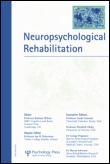
NEUROPSYCHOLOGICAL REHABILITATION
Scope & Guideline
Elevating Clinical Practices in Neuropsychology
Introduction
Aims and Scopes
- Cognitive Rehabilitation:
The journal emphasizes cognitive rehabilitation strategies for individuals with brain injuries, exploring various interventions aimed at enhancing cognitive functions such as memory, attention, and executive functioning. - Emotional and Psychological Well-being:
Research on the psychological aspects of recovery, including the relationship between emotional distress, depression, anxiety, and cognitive performance in patients with neurological disorders. - Family and Caregiver Involvement:
The journal recognizes the importance of family dynamics and caregiver perspectives in the rehabilitation process, investigating how these relationships impact recovery and adjustment. - Innovative Rehabilitation Technologies:
A growing focus on the use of technology in rehabilitation, including virtual reality, mobile applications, and telehealth solutions, to enhance cognitive and physical recovery. - Multidisciplinary Approaches:
Encourages collaboration among various disciplines, including psychology, occupational therapy, speech-language pathology, and neurology, to create comprehensive rehabilitation strategies.
Trending and Emerging
- Virtual Reality and Technology Integration:
An increasing number of studies are exploring the integration of virtual reality and other technologies into rehabilitation practices, demonstrating their potential to enhance engagement and outcomes in cognitive and physical rehabilitation. - Personalized Rehabilitation Approaches:
A notable trend towards individualized rehabilitation strategies that consider the unique needs and circumstances of each patient, moving away from one-size-fits-all models. - Post-Traumatic Growth and Resilience:
Research into post-traumatic growth is gaining attention, focusing on how individuals can develop new strengths and coping mechanisms following neurological injuries. - Family-Centered Care Models:
Emerging emphasis on involving family members in the rehabilitation process, recognizing their critical role in supporting recovery and adjustment. - Interventions Addressing Emotional Dysregulation:
A growing focus on interventions targeting emotional dysregulation, particularly in populations with brain injuries, to improve overall rehabilitation outcomes.
Declining or Waning
- Traditional Assessment Methods:
There appears to be a decreasing emphasis on traditional neuropsychological assessment methods, as newer, more dynamic assessment tools and approaches gain traction. - Generalized Rehabilitation Models:
The focus on generalized rehabilitation models that do not account for individual differences is waning, with a move towards more personalized and tailored rehabilitation strategies. - Longitudinal Studies of Recovery:
While longitudinal studies were once a staple of the journal, there is now a shift towards more immediate impact studies and pilot trials, possibly due to the need for quicker responses to emerging rehabilitation needs. - Pharmacological Interventions:
The exploration of pharmacological interventions in neuropsychological rehabilitation seems to be declining, as the focus shifts toward behavioral and cognitive interventions.
Similar Journals
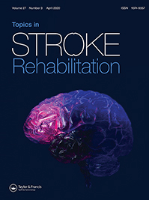
Topics in Stroke Rehabilitation
Transforming care for stroke survivors.Topics in Stroke Rehabilitation, published by Taylor & Francis Ltd, stands as a premier academic journal offering cutting-edge research and insights in the fields of rehabilitation, neurology, and community care. With an impressive impact factor reflecting its strong scholarly influence, this journal not only maintains a distinguished Q1 ranking in Community and Home Care and Rehabilitation but is also recognized in the Q2 category for Clinical Neurology, showcasing its relevance across multiple disciplines. Covering a comprehensive range of topics from neurorehabilitation techniques to patient-centered care strategies, Topics in Stroke Rehabilitation serves as an essential resource for researchers, healthcare professionals, and students dedicated to enhancing the quality of life for individuals recovering from stroke. With an accessible archive dating back to 1996 and continuous publication through 2024, this journal invites collaboration and discourse, fostering advancements in both theoretical knowledge and practical applications within the realm of stroke rehabilitation.
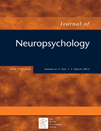
Journal of Neuropsychology
Pioneering Research in Neuropsychological ScienceThe Journal of Neuropsychology, published by WILEY, is a premier academic journal dedicated to advancing the field of neuropsychology and its related disciplines. With a focus on behavioral and cognitive neuroscience, this journal presents cutting-edge research that informs our understanding of psychological functions and their underlying neural mechanisms. Operating with an impressive impact factor representative of its rigorous peer-review process, the journal has established itself within the Q2 and Q3 quartiles of multiple relevant categories, including Neuropsychology and Physiological Psychology. Researchers will find the ISSN 1748-6645 and E-ISSN 1748-6653 useful for academic referencing as they explore articles that span innovative methodologies and insights into neurological conditions. Published continuously since 2007, the Journal of Neuropsychology stands as a vital resource for professionals and students alike, fostering scholarly discourse and knowledge exchange in neuropsychological research.
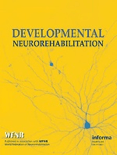
Developmental Neurorehabilitation
Bridging research and practice in pediatric rehabilitation.Developmental Neurorehabilitation is an esteemed journal published by Taylor & Francis Inc, dedicated to advancing the field of developmental neuroscience and rehabilitation. With an ISSN of 1751-8423 and an E-ISSN of 1751-8431, this journal serves as a vital resource for researchers, clinicians, and students interested in innovative therapeutic approaches and rehabilitation techniques for children and adolescents. Since its inception in 1997, Developmental Neurorehabilitation has focused on disseminating high-quality research, contributing to a deeper understanding of recovery processes in developmental disorders, and facilitating interdisciplinary dialogue among professionals. With its recognition in Q2 and Q3 quartiles across prominent categories such as Pediatrics and Rehabilitation, it stands out as a pivotal publication in its field, boasting Scopus rankings that reflect its significant impact—ranked #53 in Rehabilitation and #139 in Pediatrics, among others. While maintaining a commitment to quality research, the journal does not currently offer open access but remains accessible through institutional subscriptions, further enriching the academic landscape with critical insights into rehabilitation methodologies for developmental challenges and promoting better clinical practices to improve patient outcomes.
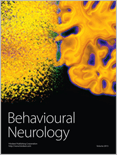
BEHAVIOURAL NEUROLOGY
Advancing Understanding: Bridging Neurology and PsychologyBEHAVIOURAL NEUROLOGY is a distinguished open-access journal published by Hindawi Ltd, dedicated to advancing the field of neurology and neuropsychology since its inception in 1988. With ISSN: 0953-4180 and E-ISSN: 1875-8584, this journal provides a platform for innovative research and interdisciplinary studies that explore the intricate connections between behavior and neurological processes. Housed in the Netherlands, BEHAVIOURAL NEUROLOGY enjoys a commendable reputation, boasting impressive quartile rankings of Q2 in various medical and psychological categories, reflecting its significant contribution to the literature with a focus on clinical neurology and physiological psychology. The journal's rigorous peer-review process ensures that published works meet high academic standards, making it an essential resource for researchers, clinicians, and students seeking to deepen their understanding of neurological disorders and cognitive function. As of 2023, it ranks in the 80th percentile in neuropsychology, further underscoring its impact and relevance in the scientific community. For those interested in accessible knowledge, BEHAVIOURAL NEUROLOGY's commitment to open access facilitates the dissemination of groundbreaking research, allowing a wider audience to engage with critical advancements in the field.

Journal of Neurorestoratology
Advancing neuro-rehabilitation through innovative research.The Journal of Neurorestoratology, published by TSINGHUA UNIV PRESS, stands as a pivotal resource in the evolving fields of neuroscience and rehabilitation. With focus areas encompassing cognitive neuroscience and neurological disorders, this Open Access journal, launched in 2013, fosters unimpeded global access to cutting-edge research and breakthroughs in neuro-restorative techniques and therapies. Although it is relatively new, it has demonstrated its potential impact within the academic community, ranking in the 51st percentile for Medicine _ Rehabilitation and contributing novel insights in the realms of speech and hearing, neurology, and cognitive neuroscience. With its commitment to disseminating innovative findings and promoting interdisciplinary collaboration, the Journal of Neurorestoratology plays a crucial role in advancing our understanding and management of neuro-rehabilitation, making it a valuable platform for researchers, healthcare professionals, and students alike.
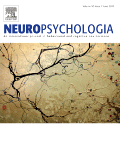
Neuropsychologia
Unlocking the Secrets of the Mind through Innovative StudiesNeuropsychologia, published by PERGAMON-ELSEVIER SCIENCE LTD, is a premier journal that delves into the intersections of psychology and neuroscience, specifically focusing on behavioral and cognitive processes. Since its inception in 1963, this esteemed journal has been a vital platform for researchers, professionals, and students, showcasing innovative studies and advancements in the fields of Behavioral Neuroscience, Cognitive Neuroscience, and Experimental Psychology. With a commendable impact factor, placing it in the Q2 category across multiple disciplines, Neuropsychologia is recognized for its contribution to the scientific community, ranking among the top journals in both Experimental and Cognitive Psychology and Neuroscience. The journal's commitment to excellence is evident in its rigorous peer-review process and its mission to disseminate cutting-edge research, making it an invaluable resource for those seeking to expand their knowledge and insights in neuropsychology. For further reading, the journal is accessible in both print and digital formats, ensuring that researchers can easily engage with the latest findings and theoretical advancements in this dynamic field.
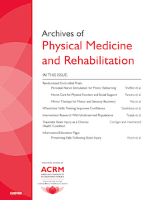
ARCHIVES OF PHYSICAL MEDICINE AND REHABILITATION
Discovering New Frontiers in Therapy and RecoveryArchives of Physical Medicine and Rehabilitation, published by W B Saunders Co-Elsevier Inc., is a premier academic journal dedicated to the fields of physical therapy, sports therapy, and rehabilitation. Since its inception in 1945, it has evolved to provide a platform for groundbreaking research and insightful discourse that shapes clinical practice and enhances patient outcomes. With a notable impact factor and ranking in the top quartiles of its respective categories, this journal consistently showcases the most innovative studies, systematic reviews, and evidence-based practices that drive forward the understanding of rehabilitation medicine. As a vital resource for researchers, healthcare professionals, and students alike, it contributes significantly to the advancement of knowledge in rehabilitation sciences. With an aim to bridge the gap between research and practice, the journal invites contributions from all disciplines related to physical medicine and rehabilitation, fostering a collaborative environment that promotes the dissemination of impactful findings.

PSYCHOLOGIA
Illuminating the Path of Psychological KnowledgePSYCHOLOGIA is a distinguished academic journal published by the Psychologia Editorial Office, focusing on the broad field of psychology. Originating from Japan, the journal serves as a platform for innovative research and insights into various psychological phenomena, contributing significantly to the advancement of psychological knowledge since its establishment in 1996. With an ISSN of 0033-2852 and an E-ISSN of 1347-5916, PSYCHOLOGIA primarily targets researchers, professionals, and students who are passionate about the intricacies of human behavior and cognition. Currently categorized in the Q4 quartile of psychology (miscellaneous) based on 2023 metrics, it holds a Scopus rank of #157 out of 216, indicating its developing presence within the academic community. Despite being published without open access options, the journal remains committed to fostering scholarly dialogue and disseminating significant findings that shape contemporary psychological research. As it converges towards its issue set for 2024, PSYCHOLOGIA continues to be an essential resource for those seeking to deepen their understanding of psychological sciences.
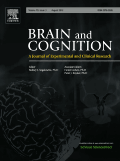
BRAIN AND COGNITION
Pioneering Research in Cognitive ProcessesBRAIN AND COGNITION, published by Academic Press Inc Elsevier Science, stands as a vital resource for researchers and practitioners in the realms of cognitive neuroscience and psychology. Established in 1982, the journal has continuously evolved, showcasing cutting-edge research that bridges the understanding of brain functions and cognitive processes up to 2024. With an impressive impact factor reflecting its commitment to high-quality scholarship, the journal currently holds a prestigious Q1 ranking in Arts and Humanities (miscellaneous) and notable Q2 rankings in various psychology fields, including Cognitive Neuroscience, Developmental and Educational Psychology, Experimental and Cognitive Psychology, and Neuropsychology. This multidisciplinary journal cultivates a rich academic dialogue, offering valuable insights to professionals, researchers, and students alike. Although it does not offer open access, its robust indexing in Scopus and consistent contribution to important discussions in cognitive research define its critical role in advancing knowledge and innovation in the cognitive sciences.

NEUROPSYCHOLOGY REVIEW
Illuminating the Links Between Neural Mechanisms and BehaviorNEUROPSYCHOLOGY REVIEW is a prestigious journal published by Springer, dedicated to the exploration of cognitive processes and behavior through neurological and psychological perspectives. With its ISSN 1040-7308 and E-ISSN 1573-6660, this journal holds a distinguished position in Q1 of the Neuropsychology and Physiological Psychology category, ranking at #3 out of 76 with an impressive 96th percentile in Scopus. Since its inception in 1990, it has provided a critical platform for researchers, professionals, and students to disseminate and engage with comprehensive reviews and empirical research, promoting a deeper understanding of the interplay between neural mechanisms and psychological phenomena. Aimed at fostering interdisciplinary collaboration and advancement in the field, NEUROPSYCHOLOGY REVIEW invites contributions that push the boundaries of knowledge and stimulate ongoing debates in neuropsychology, making it an invaluable resource for anyone interested in the latest scientific advancements within this dynamic area.